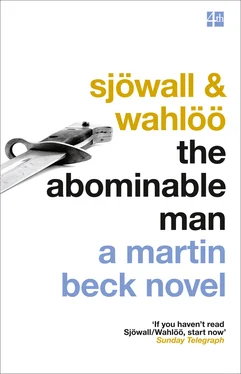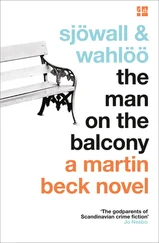The examinations – which ironically enough the doctors referred to as the ‘investigation’ – wore him out and made him feel worse. And the sicker he felt, the more intense his fear of death became, until it circumscribed his entire conscious life and left him utterly naked, in a state of spiritual exposure and almost obscene egoism.
Something rustled outside the window. An animal of course, padding through the withered rose bed. A field mouse or a hedgehog, maybe a cat. But didn't hedgehogs hibernate?
It must be an animal, he thought, and then no longer in control of his actions, he raised his left hand towards the electric call-button that hung in comfortable reach, wound once around the bedpost.
But when his fingers brushed the cold metal of the bed frame, his hand trembled in an involuntary spasm and the switch slid away and fell to the floor with a little rattling bang.
The sound made him pull himself together.
If he'd gotten his hand on the switch and pushed the white button, a red light would have gone on out in the corridor above his door and soon the night nurse would have come trotting from her room in her clattering wooden clogs.
Since he wasn't only afraid but also vain, he was almost glad he hadn't managed to ring.
The night nurse would have come into the room and turned on the overhead light and stared at him questioningly as he lay there in his wretchedness and misery.
He lay still for a while and felt the pain recede and then approach again in sudden waves, as if it were a runaway train driven by an insane engineer.
He suddenly became aware of a new urgency. He needed to urinate.
There was a bottle within reach, stuck down in the yellow plastic wastebasket behind the night table. But he didn't want to use it. He was allowed to get up if he wanted to. One of the doctors had even said it would be good for him to move around a little.
So he thought he'd get up and open the double doors and walk to the toilet, which was right on the other side of the corridor. It was a distraction, a practical task, something that could force his mind into new combinations for a time.
He folded aside the blanket and the sheet, heaved himself into a sitting position and sat for several seconds on the edge of the bed with his feet dangling while he pulled at the white nightgown and heard the plastic mattress cover rustling underneath him.
Then he carefully eased himself down until he felt the cold stone floor beneath the damp soles of his feet. He tried to straighten up and, in spite of the broad bandages that pulled at his groin and tightened around his thighs, he succeeded. He was still wearing plastic foam pressure-dressings from the aortography the day before.
His slippers lay beside the table and he stuck his feet into them and walked cautiously and gropingly towards the door. He opened the first door in and the second out and walked straight across the shadowy corridor and into the lavatory.
He went to the toilet and rinsed off his hands in cold water and started back, then stopped in the corridor to listen. The muffled sound of the night nurse's radio could be heard a long way off. He was in pain again and his fear came back and he thought after all he could go in and ask for a couple of painkillers. They wouldn't have any particular effect, but anyway she'd have to unlock the medicine cabinet and take out the bottle and then give him some juice, and that way at least someone would have to fuss over him for a little while.
The distance to the office was about sixty feet and he took his time. Shuffled along slowly with the sweaty nightshirt slapping against his calves.
The light was on in the duty room but there was no one there. Only the transistor radio, which stood serenading itself between two half-emptied coffee cups.
The night nurse and the orderly were busy someplace else of course.
The room began to swim and he had to support himself against the door. It felt a little better after a minute or two, and he walked slowly back towards his room through the darkened corridor.
The doors were the way he'd left them, slightly ajar. He closed them carefully, took the few steps to the bed, stepped out of his slippers, lay down on his back and pulled the blanket up to his chin with a shiver. Lay still with wide-open eyes and felt the express train rushing through his body.
Something was different. The pattern on the ceiling had changed in some slight way.
He was aware of it almost at once.
But what was it that had made the pattern of shadows and reflections change?
His gaze ran over the bare walls, then he turned his head to the right and looked towards the window.
The window had been open when he left the room, he was certain of that.
Now it was closed.
Terror overwhelmed him immediately and he lifted his hand to the call button. But it wasn't in its place. He'd forgotten to pick up the cord and the switch from the floor.
He held his fingers tightly around the iron pipe where the buzzer ought to have been and stared at the window.
The gap between the long curtains was still about two inches wide, but they weren't hanging quite the way they had been, and the window was closed.
Could someone from the staff have been in the room?
It didn't seem likely.
He felt the sweat bursting from his pores, and his nightshirt cold and clammy against his sensitive skin.
Completely at the mercy of his fear and unable to tear his eyes from the window, he began to sit up in bed.
The curtains hung absolutely motionless, yet he was certain someone was standing behind them.
Who, he thought.
Who?
And then with a last flash of common sense: This must be a hallucination.
Now he stood beside the bed, ill and unsteady, his bare feet on the stone floor. Took two uncertain steps towards the window. Came to a stop, slightly bent, his lips twitching.
The man in the window alcove threw aside the curtains with his right hand as he simultaneously drew the bayonet with his left.
Reflections glittered on the long broad blade.
The man in the lumber jacket and the chequered tweed cap took two quick steps forward and stopped, legs apart, tall, straight, with the weapon at shoulder height.
The sick man recognized him at once and started to open his mouth to bellow.
The heavy handle of the bayonet hit him across the mouth and he felt his lips being torn to shreds and his dental plate breaking.
And that was the last thing he felt.
The rest of it went too fast. Time rushed away from him.
The first blow caught him on the right side of his diaphragm just below his ribs, and the bayonet sank in to its hilt.
The sick man was still on his feet, his head thrown back, when the man in the lumber jacket raised the weapon for the third time and sliced open his throat, from the left ear to the right.
A bubbling, slightly hissing noise came from the open windpipe.
Nothing more.
It was Friday evening and Stockholm's cafés should have been full of happy people enjoying themselves after the drudgery of the week. Such, however, was not the case, and it wasn't hard to work out why. In the course of the preceding five years, restaurant prices had as good as doubled, and very few ordinary wage-earners could afford to treat themselves to even one night out a month. The restaurant owners complained and talked crisis, but the ones who had not turned their establishments into pubs or discotheques to attract the easy-spending young managed to keep their heads above water by means of the increasing number of businessmen with credit cards and expense accounts who preferred to conduct their transactions across a laden table.
The Golden Peace in the Old City was no exception. It was late, to be sure – Friday had turned into Saturday – but during the last hour there had been only two guests in the ground-floor dining room. A man and a woman. They'd eaten steak tartare and were now drinking coffee and punsch as they talked in low voices across the table in the alcove.
Читать дальше












